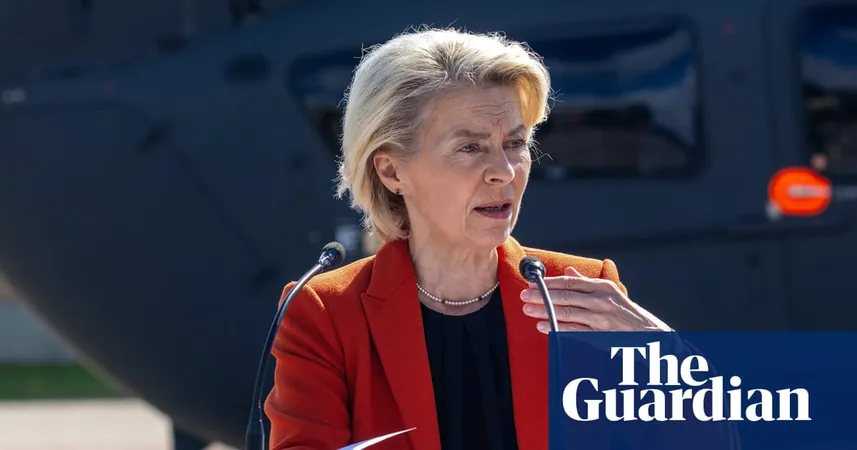
Russia's GPS Jamming Raises Alarms as Ursula von der Leyen's Flight Delayed
2025-09-01
Author: Ying
In a shocking turn of events, a plane carrying European Commission President Ursula von der Leyen was reportedly subjected to GPS jamming by Russia while flying over Bulgaria, causing significant delays during her trip.
Von der Leyen was en route to Plovdiv on Sunday when her charter aircraft lost vital satellite navigation, forcing it to circle the airport for an entire hour. This incident was confirmed by Arianna Podestà, a deputy spokesperson for the European Commission, who stated that Bulgarian authorities suspect Russian interference.
"We are all too familiar with the threats and intimidation stemming from Russia's hostile behavior," Podestà remarked, emphasizing the seriousness of interference with navigation systems which has increasingly become a common threat in airspace near Russia. The spokesperson refrained from commenting on whether von der Leyen was specifically targeted, suggesting that the question should be directed at the Russians.
A Pattern of GPS Interference
This incident is not isolated. In March 2024, a similar scenario involved UK Defence Secretary Grant Shapps, whose RAF plane experienced GPS interference near the Russian exclave of Kaliningrad. Such electronic warfare tactics, known as GPS jamming and spoofing, have surged since the onset of Russia's invasion of Ukraine in 2022.
A recent internal EU document outlined a troubling pattern, categorizing the jamming and spoofing incidents as systematic and deliberate actions by Russia and Belarus. Poland and Lithuania alone reported thousands of cases of interference this year.
EU's Response and Broader Security Concerns
In light of these escalating threats, the European Commission has imposed sanctions against companies involved in GPS signal disruption, specifically pointing to Russian origin. Additionally, they are formulating aviation-specific plans and broader strategies to counteract these jamming efforts.
While von der Leyen continued her trip across the EU's eastern border, she addressed military and hybrid threats, indicating the ongoing tension in the region. She highlighted incidents like drone crossings from Belarus as tests not just for Lithuania but for Europe as a whole.
Ukraine's Crisis Deepens
Compounding regional instability, Ukrainian police announced a chilling incident involving the murder of former parliamentary speaker Andriy Parubiy, alleging Russian involvement in his assassination. The brutal attack, carried out by a disguised assailant in broad daylight, raised further alarm about the heightened risks for those opposing Russian influence.
President Volodymyr Zelenskyy condemned the assassination as a threat to national security amid the ongoing war, with international efforts still struggling to find a peaceful resolution.
Future of Ukraine's Defense
Meanwhile, von der Leyen reaffirmed the commitment of Ukraine’s allies to fortifying security guarantees. She described Ukraine’s army as the first line of defense, supported by an international coalition. However, questions loom regarding how many European countries would be willing to deploy troops and the extent of their involvement.
With an upcoming meeting of European leaders in Paris aimed at discussing solutions, the international community watches closely as tensions continue to escalate in this critical context.




 Brasil (PT)
Brasil (PT)
 Canada (EN)
Canada (EN)
 Chile (ES)
Chile (ES)
 Česko (CS)
Česko (CS)
 대한민국 (KO)
대한민국 (KO)
 España (ES)
España (ES)
 France (FR)
France (FR)
 Hong Kong (EN)
Hong Kong (EN)
 Italia (IT)
Italia (IT)
 日本 (JA)
日本 (JA)
 Magyarország (HU)
Magyarország (HU)
 Norge (NO)
Norge (NO)
 Polska (PL)
Polska (PL)
 Schweiz (DE)
Schweiz (DE)
 Singapore (EN)
Singapore (EN)
 Sverige (SV)
Sverige (SV)
 Suomi (FI)
Suomi (FI)
 Türkiye (TR)
Türkiye (TR)
 الإمارات العربية المتحدة (AR)
الإمارات العربية المتحدة (AR)